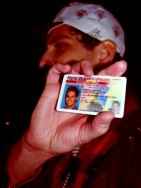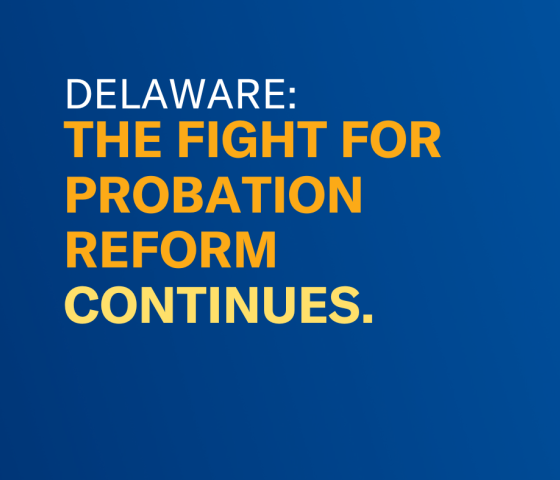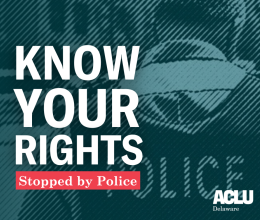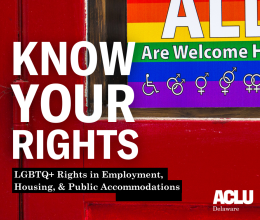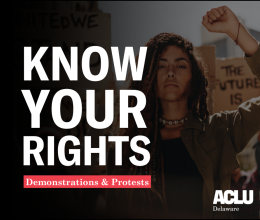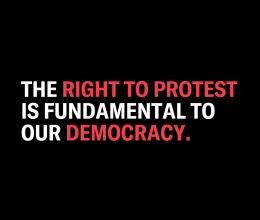When all is said and done, the role of ACLU of Delaware’s legal program is to convince government officials to follow the U.S. and Delaware Constitutions and sue them when they won’t. We make every effort to alert school boards, city councils, state departments and other governmental agencies that they may be violating the Bill of Rights as soon as we become aware of potential problems. Sometimes they follow our guidance and suggestions.
Below are highlights of some of our work in 2012.
Please alert us if you become aware of constitutionally questionable happenings in your community.
Free Speech
- After winning a Temporary Restraining Order in November 2011, Occupy Delaware took root on the plaza across from the City-County Building in Wilmington until April 2012 when Mayor Baker attempted to kick them out. We rushed back to court and began intensive litigation against the city. Ultimately, protesters remained until late August, when they voluntarily left to make way for a planned renovation. Occupy Delaware was the longest-running public encampment in the nation due to ACLU work.
- Christina School District permitted a middle school student with pink hair to resume her education after hearing from us. She had been barred from school after her parents allowed her to dye her hair pink for making the honor roll. The school claimed that she had violated the dress code although there was no such written rule.
- Capital School District rejected proposed social media policies that would have restricted students’ First Amendment right to off campus internet use.
- The Delaware Department of Transportation agreed that an employee was entitled to drive his personal vehicle with a Confederate Flag plate to work after we convinced it that he had a First Amendment right to do so.
Freedom of Religion
- After months of negotiation, a Muslim death row inmate won the right to receive pastoral counseling from an imam without forfeiting visits from friends and family. The protestant staff chaplain at Vaughn Prison regularly provides pastoral counseling to inmates without his visits being counted against their allowed limit. But when a Muslim inmate received pastoral counseling from a volunteer imam who was not on staff, the Department of Correction reduced the number of visits he could receive. After DOC received a copy of the suit papers we were about to file, it agreed that an imam’s visits would be treated no differently than a chaplain’s visits.
Education
- Superior Court overruled Christina School District’s refusal to fill a board vacancy with a candidate from Wilmington who had previously served 29 years on the board. Due to the structure of the school district’s election law, the suburban residents of Christina are generally able to choose the representative from the Wilmington portion of the district. When there is a vacancy, the board is required to choose the replacement member from applicants who follow a prescribed process. For two months running, George Evans, who had been favored in the last election by the overwhelming majority of the voters from the Wilmington portion of the district, was the only applicant. The school board refused to appoint him until we prevailed in court. The case also led to a News Journal editorial urging amendment of the election law.
- The Secretary of Education required a charter school to provide free and reduced cost meals to low-income students and to implement an outreach program to increase student diversity as a condition of expanding.
- The Delaware Department of Education agreed to revise its draft of statutorily mandated definitions of conduct that may result in expulsion or placement in an alternative school.
Prison Conditions
The Department of Correction began to slowly implement the changes in the operation of the women’s prison to prevent rape and other sexual abuse that are required by the settlement of a lawsuit we brought on behalf of an inmate raped in that prison.
Rights of the Mentally Ill
- The Division of Health and Social Services revised legislation dealing with the hospitalization of mentally ill people before it was enacted.
- We provided the Division of Health and Social Services with authoritative information on the policies and training needed to improve police interaction with mentally ill persons.
Immigrant Rights
- After we supplied the Superior Court Rules Committee with materials establishing the court’s obligation to provide interpreters to non-English speakers, the Administrative Office of the Courts directed that interpreters be provided for all criminal judicial proceedings. We had previously submitted a friend-of-the-court brief to Superior Court arguing that the court was required to appoint (and pay for) an interpreter for a Spanish speaking man who was represented by private counsel but could not afford an interpreter. In that case, Superior Court decided the man was indigent and could not afford counsel, so it appointed the Office of the Public Defender to represent him. The Public Defender supplied an interpreter and the legal question was not resolved. Rather than wait for the problem to arise again during the compressed time period of a criminal case, we sent our brief and supporting papers to the Committee, and the system-wide requirement resulted.
- We submitted a friend-of-the-court brief to the Delaware Supreme Court arguing that federal immigration law does not excuse an employer from its obligation to pay workers’ compensation benefits to an undocumented immigrant injured on the job, and the Court agreed.
- Working with us, the Delaware State Police adopted a new policy to meet its federal law obligation to provide for adequate communications with non-English speaking persons, and began implementing new procedures and training.
- The Delaware Department of Labor reopened the unemployment claim of three Nepalese refugees who were unable to navigate the system because they do not speak English, and reviewed its procedures with the U.S. Department of Labor’s Civil Rights Center.
Privacy
- The Department of Motor Vehicles instructed its staff that they were not to require applicants for Delaware driver’s license renewal to submit the information required for federally compliant driver’s licenses.
Family Rights
- After we submitted a friend-of-the-court brief, Superior Court entered a stipulated order recognizing that a same-sex couple married in California before the effective date of the Delaware Civil Unions law has the right to assert spousal privilege against testifying.
Freedom of Information
- We prevailed in a suit brought against the City of Wilmington to compel it to provide us with documents governing its use of tasers against civilians and its acquisition of personal cell phone information from wireless carriers.


